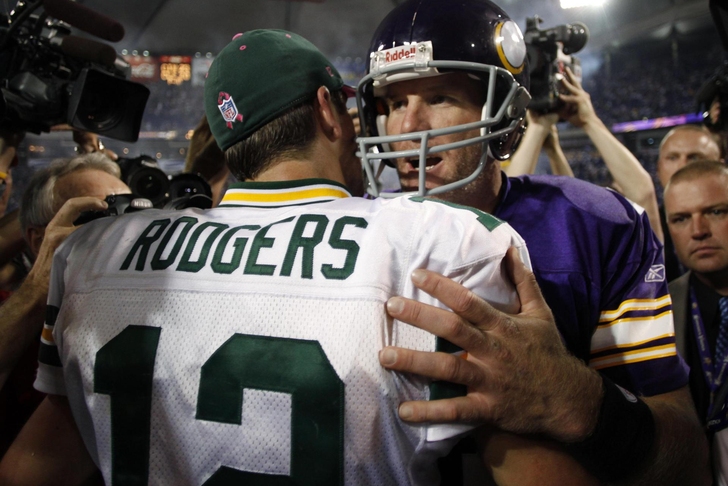The Indianapolis Colts, lead by third-year pro Andrew Luck, upset the Denver Broncos lead by Luck's predecessor Peyton Manning in the Divisional Playoffs on Sunday. Colts owner Jim Irsay took a moment outside the winning locker room to revisit the decision, which he described as "the right thing to do for the Colts." Irsay had a future Hall of Fame quarterback in one hand in 2012, and the option to move ahead and draft a once-in-a-generation talent in the other. The organization chose the latter, in a decision many compared to a similar dilemma faced by the Green Bay Packers after the 2007 season.
The Packers didn't face injury concerns with Brett Favre, but they were being held captive by his annual indecisiveness. After flirting with retirement for years and falling just short of his third Super Bowl appearance in an NFC Championship loss to the New York Giants that year, Favre decided once-and-not-quite-for-all to hang 'em up. Favre said through teary eyes that "As they say, all good things must come to an end. I look forward to whatever the future may hold for me."
The Packers, as well as the majority of fans across the league took this as Favre's final decision, and began to move forward as a franchise. However, in June Favre called up Mike McCarthy and told his former coach he wanted to return. As Favre recalled, "When he picked up the phone again after he dropped it, he said, 'Oh, God, Brett. You're putting us in a tight spot. He said, 'Brett, playing here is not an option.' Those were his exact, exact words."
The Packers made an organizational decision to move forward with the QB they had drafted 24th overall in 2005 to be Favre's eventual successor, Aaron Rodgers. Favre was traded to the New York Jets for a conditional draft pick and spent on season there before returning to the NFC North for two more seasons with the Minnesota Vikings. The rest, as they say, is history. Not to mention the birth of a legacy that continued to grow on Sunday as Rodgers led the Packers to a 26-21 victory over the Dallas Cowboys to advance to the NFC Championship.
The jury may still be out on who won Manning vs. Luck as long as Manning remains in the league, but Favre vs. Rodgers is much less hazy. Favre ran out of gas and tore his bicep in his lone season with the Jets, starting 8-3 in 2008 but finishing 9-7 and missing the playoffs.
[caption id="" align="alignnone" width="1800"] Favre tries to elude the grasp of Clay Matthews, whom the Packers used their conditional pick from the Jets to draft after the Favre trade.[/caption]
Favre tries to elude the grasp of Clay Matthews, whom the Packers used their conditional pick from the Jets to draft after the Favre trade.[/caption]
His first season with the Vikings, Favre showed the world he still had quite a bit left in the tank, throwing 33 touchdowns and only seven interceptions in 2009 while leading Minnesota to the NFC Championship. However, a critical interception in overtime against the New Orleans Saints kept the old gunslinger from going out on top. Favre instead backed out of the league beaten and bruised, as his career came to an anti-climactic end on the frozen field of TCF Bank Stadium when he sustained a concussion on a hit by Chicago Bears defensive end Corey Wootton. The Vikings finished 6-10 that year, and Favre finally rode off into the sunset with his arm in a sling instead of clutching a Lombardi trophy as he may have imagined.
[embed]https://www.youtube.com/watch?v=zrLnBWY_ga0[/embed]
Meanwhile, Rodgers began a quick ascendance into the conversation of elite quarterbacks after three years sitting behind Favre. Rodgers kept the offense in the top five in points scored his first season, but the defense plummeted from sixth to 22nd in scoring as the team finished 6-10 in 2008. In 2009, the Packers made it to the playoffs as the defense began to improve and Rodgers earned a Pro Bowl nod that turned into a starting spot when Favre and Drew Brees dropped out. Then in 2010, it all came together for Rodgers and the Packers, as the third-year starter led his team to a Super Bowl victory in what was also Favre's final season in the league. The conditional pick that Green Bay got from the Jets became a third-rounder was packaged in a deal that allowed the Packers to move back into the first round and draft Clay Matthews in 2009. Matthews played a critical role in the 2010 Super Bowl season as well, registering 13.5 sacks and receiving consideration for the Defensive Player of the Year award that season.
Had Green Bay elected to take the win-now approach and surround Favre with more weapons, it may have resulted in Rodgers never seeing a down as starting QB of the Packers. Rodgers was signed to a five-year contract after being drafted, and was unlikely to stick around and be resigned if the Packers back-tracked and gave into Favre. There were also rumors prior to the 2007 season that Rodgers was going to be shipped to the Oakland Raiders for then-receiver Randy Moss. Had this deal gone down, the Packers may have resembled today's Broncos, which given recent reports, may not have gone well for McCarthy had he not delivered.
Sometimes, it may be better if great players just retired, and stayed retired.
For more Packers content, download our Chat Sports app to your mobile device and follow @ZacBellman_WNY and @ChatPackers on Twitter.
Back to the Green Bay Packers Newsfeed